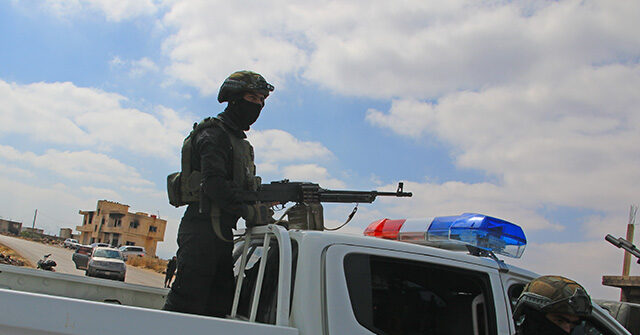Christians in the Syrian provinces of Hama and Homs called a general strike, blocked roads, set fire to a security checkpoint, and marched to demand justice after two of their number were murdered and a third was injured by masked gunmen wearing the uniforms of the General Security Service, the national police force of the central government controlled by President Ahmed al-Sharaa.
The attack occurred on Wednesday evening in the village of Anaz, located in a region of Homs known as Wadi al-Nasara, or the “Valley of Christians.” According to eyewitnesses, four masked men wearing government security uniforms rode up to the village mayor’s home and opened fire on a group of young men gathered outside, downing three victims with a hail of at least 30 bullets.
The gunshot victims were identified as three Christians named George Mansour, Shafiq Rafiq Mansour, and Pierre Hreikos. Cousins George and Shafiq Mansour were killed instantly, while Hreikos was taken to the hospital with critical injuries. Early reports said he had died of his wounds, while an update on Thursday evening said he was still alive. Several other injuries were reported from the shooting.
News of the attack spread like wildfire among Christians who have been fearful of persecution ever since Sharaa, a former leader in the al-Qaeda terrorist organization, and his alliance of jihadi groups overthrew Syrian dictator Bashar Assad in December.
Sharaa has promised to deliver an inclusive, but still Islamist, government that will respect the rights of Syria’s many ethnic and religious groups. He has won support from international leaders hoping to rebuild Syria and end the massive humanitarian crisis caused by its bloody 14-year-long civil war, including President Donald Trump.
There have been incidents of mass violence against minorities in Syria since Sharaa took power, including attacks on the Alawite Muslims, an offbeat sect of Shia Islam that counted the Assad dynasty as members, plus the Druze living near the border with Israel, and Syrian Christians.
In every case, the attackers included jihadis allied with Sharaa’s organization, Hayat Tahrir al-Sham (HTS). Eyewitnesses frequently reported the attackers were wearing uniforms or insignia of the new Syrian central government’s security services, as was the case in Anaz. Troops from the central government openly assisted Bedouin Muslims with killing the Druze in July, prompting Israel to intervene with strikes on Syrian military convoys and headquarters buildings.
Sharaa and his officials have responded to these allegations by either claiming the killers were rogue members of the HTS alliance, or blaming the victims for initiating violent encounters. Sharaa promised to investigate the worst reports of violence against the Druze, for example, but also claimed Druze “outlaws” were working with Israel to destabilize his government.
The Syrian government’s head of security for Homs province, Brig. Gen. Murhaf al-Nusan, denounced the Anaz shooting and described the masked gunmen as criminals seeking to exacerbate tensions in the region. He urged residents of the province to “remain calm and avoid being drawn into rumors or provocations.”
“We condemn this heinous crime in the strongest terms and categorically reject all forms of violence that threaten the safety and stability of society. The aim of this criminal act is to destabilise security, spread fear in the region, and attempt to influence the parliamentary election process,” he said.
Syria is scheduled to hold parliamentary elections on October 5, although they will not quite be a triumph of democracy and representative government.
Sharaa will personally appoint one-third of the legislators, while the others will be chosen by “electoral colleges” in every district. Outside observers estimate that about 6,000 electors across the country will choose the new parliament. The area controlled by the Kurdish-led Syrian Democratic Forces (SDF) will not participate in the elections due to ongoing political tensions with Damascus.
On Wednesday evening, a Sunni Muslim community near Walid al-Nasara issued a public statement “condemning in the strongest terms the heinous crime that took place in the village of Anaz, which claimed the lives of several young men.”
The Muslims of the town of Qalat al-Hosn said the attack had “nothing to do with our morals, our values, or our shared history with our neighbours in Wadi al-Nasara.”
“There are those seeking to ignite discord and strike at civil peace and coexistence among the region’s communities,” the statement said, echoing the condemnation offered by Gen. Nasan.
The residents of Qalat al-Hosn may have been motivated to speak out by rumors that the masked gunmen fled there after attacking Anaz, and might have originally come from Qalat al-Hosn.
The London-based Syrian Observatory for Human Rights (SOHR) cited sources who said one of the shooting victims was in court two days before the shooting to answer charges filed by a resident of al-Hosn.
Christians in the Wadi al-Nasara region remained outraged by the killings, and unconvinced that Assad’s government has their best interests at heart. The murders in Anaz came after several other attacks on Syrian minorities over the past few weeks, including the assassination of Haidar Shahin, an Alawite candidate for parliament in the coastal province of Tartus.
On Thursday, villagers from Anaz reportedly burned down a General Security Service (GSS) checkpoint, blockaded the road from Wadi al-Nasara to the Muslim village of Qalat al-Hosn, and called for a general strike across Wadi al-Nasara. Churches were urged to ring their bells in memory of the Anaz shooting victims.
Another call from protesters was for Christian candidates to withdraw from the election because the new parliament would be “illegitimate and not elected by the people.” A candidate from Wadi al-Nasara named Ghassan al-Shami withdrew from the election on Thursday.
Unsatisfied by Gen. Nassan’s statement about the murders, Christians called for all GSS forces to withdraw from the area, blasting the security forces for doing little more than issuing formulaic denunciations as attacks against Christians mounted.
“We would rather die than accept humiliation. Christian blood is precious,” demonstrators chanted as they marched across Wadi al-Nasara on Thursday.
According to SOHR, the total number of documented victims from acts of persecution and “retaliation” across Syria this year rose to 1,070 after the murders in Anaz. 32 of those victims were women, and 21 were children.
The post Outrage in Syria After Christians Killed by Masked Gunmen in Government Uniforms appeared first on Breitbart.




